
Publisher:
Bonnie King
CONTACT:
Newsroom@Salem-news.com
Advertising:
Adsales@Salem-news.com

~Truth~
~Justice~
~Peace~
TJP
May-31-2011 06:27

 TweetFollow @OregonNews
TweetFollow @OregonNews
Snitch Sheets, Unresolved Murder and Severe Tobacco Crimes
Tim King Salem-News.comWho exactly is Running the Oregon State Penitentiary?
 Terrence Kimble and Clayton Howard are political prisoners in Oregon; the state retaliated against them for backing a guard who blew the whistle over racism. |
(SALEM, Ore.) - Watching innocent prisoners being set free on the news over wrongful convictions; it has been nothing less than invigorating; the problem is that none of this is taking place in Oregon. I suspect this state may have more wrongly convicted people serving time than any other in the US. Oregon has been off the radar for decades.
 Oregon's former Corrections Chief: |
Certain people, however silently, have been waging a campaign against the state's illegal, corrupt and criminal practices. I have seen enough to not bother using the word 'alleged' because that happened long ago. One silent fighter is Michael Francke; the former head of Oregon's prisons who was murdered three days before revealing the findings of serious corruption in the Oregon Department of Corrections.
There was a scapegoat, but the conviction was ruthless and shoddy and not one rational person ever believed that Francke was killed by a young Salem man named Frank Gable. He has been behind bars now for over 21 years. There are many criminals in Oregon's government then and now who are directly involved; they have to have been, there is no other logical conclusion.
A great deal goes through my mind when I think about Terrence Kimble, Clayton Howard and William Coleman. Kimble and Howard are inmates and Coleman was a guard at the Oregon State Penitentiary (OSP) in Salem, one major street south of the prison headquarters where Francke's body was discovered in 1989.
Neither Coleman, Kimble or Howard set out to have it this way, but their lives are intertwined and even co-dependent now. A third African-American inmate, John Smith, also did what he could to prevent the injustice suffered by all parties.
Nazi Movies for Convicted Masses

August 2005 is when the staff at the prison decided to play a movie for inmates called 'Downfall' that recounted the last days of Adolf Hitler's life in Nazi, Germany.
The movie is a massive blood and suicide fest, but even worse; it portrays the actions of men of the Third Reich in ways that make them seem overly human, even kind. Dr. Joseph Goebbels, German politician and Reich Minister of Propaganda in Nazi Germany himself, who used to experiment on living Jewish children held captive in the Nazi death camps, is shown as a pretty nice guy.
Coleman says all types of problems followed the playing of this highly sensitive film to a prison full of hardcore convicts already swimming in socially related issues.
White inmates began screaming 'sig heil' and 'heil Hitler' before the movie was over, and minority inmates, particularly those who were Jewish, Coleman says, were scared to emerge from their cells for days. This, because of a staff decision to play for inmates the very last movie on earth they ever should have responsibly been shown.
Somehow these incidents are still being glossed over. The question is simple, who allowed it, and are they still employed? We know that Mr. Coleman's attempts to expose these allegations led to his not working there any longer, however those behind the decision to play that film are, from what we understand, still fully employed.
 Oregon State Penitentiary overview; it is the state's oldest. |
I asked Coleman why on earth the prison chose to play this film. He said, "Movies with rape, movies that show nudity, promote violence; even the kickboxing movies, are not allowed to be shown in the prison system."
Again, I asked how or why a movie exploiting Nazism would have been played. Coleman said the answer, however stupid, is simple. "They wanted to show who was in charge, the white supremacists wanted to see that movie and they played it for them."
Well at least we know who is in charge. He says the prison staff at the Oregon state prison replied to the situation by saying:
"Coleman, it is all in how you perceive it. It is not a bad movie, that is just your perception of it."
He states it as if there were a previous consensus, which there may have been, and if so, there is one more count of Conspiracy waiting to go to trial.
Then these same words about Coleman's 'perception' would later be repeated by a Marion County prosecutor named Bryan Orrio in court. This is the prosecutor that unsuccessfully attempted to convict Coleman of very serious charges involving tobacco smuggling. (The part about 'perception' - offering a strong hint as to why they lost the case so completely.)
Retribution Against a Whistleblower
Amazingly, those charges were filed against Coleman the same afternoon he filed documents for a wrongful termination case against the Oregon State Hospital (OSH). (Coleman worked for the state hospital as a security guard after resigning his position at the prison. He experienced remarkably similar circumstances during this employment at the state hospital in Salem also.)
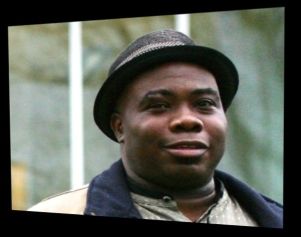 William Coleman |
Marion County's 15-count indictment against Coleman alleged that he smuggled cigarettes as a prison guard, and prosecutors said at the time that if he were to be convicted, he faced up to 40-years in prison. Coleman was arrested and humiliated and this fully compromised his Whistleblower claim against Oregon DOC- of course.
Considering how shoddy the investigation was, it is understandable why Coleman is dismayed. Witnesses who were absolutely key to events; people who could verify Coleman's claims that would have brought the roof down on officials, were completely ignored by Oregon State Police investigators who clearly and by their own admission, knew exactly what they were doing. Their job was clearly to frame Coleman, nothing more, nothing less.
At least one of those investigators would later be used by the state to falsely discredit Coleman during his civil trial, by implying that Coleman was a criminal suspect, without fully disclosing that he completely defeated the case against him and was found totally innocent.
After being charged, and arrested, this former law enforcement officer, a full academy graduate (which not all Oregon correctional officers are) was offered more than one plea deal over the following months as he prepared his case, and William was told that if he entered a guilty plea to a lesser charge, he could avoid prison time, but they also said he would never work in law enforcement again, and he would have to "drop the whistleblower claim against Oregon DOC," (Dept. of Corrections) seriously. Orrio actually wrote that on a plea deal.
Coleman says he never at any time considered entering a guilty plea, because he was not guilty, and he might be one of the only people ever framed by an Oregon prosecutor this way who didn't buckle. I honestly believe that many who work for the state in Oregon are good people, but it is also perilously true that some key players are not, and they are running unchecked by their own supervisors and believe me, everybody in government has one. When the state fails to address its problems, then the humiliating idea of federal intervention comes into play.
The prosecutors wanted Coleman to take the plea deal on the charges that in retrospect, are very hard to take seriously.
In fact, reading the amazing documented details from Coleman's superiors' reports specifying exactly how many "cans of tobacco" Coleman was said to be smuggling, and his alleged profits in exact figures, are just mind boggling. I suspect that in the history of mankind, no cops ever put this amount of time into trying to convict a guy of smuggling cigarettes. Of course that is what keeps corrupt cops and prosecutors in business.
Rules against tobacco in the prison system are just black market facilitators anyway. Think about it. Why create a market for a product that isn't even illegal on the outside?
Remember this when you hear people talking about, "how good those guys in prison have it with color TV's'-" in fact there is not a single pleasant thing for prisoners, and the stupid rampant corruption tied to things like the actual tobacco smuggling programs that benefit the white supremacists and certain staff that are on the take, are the shame of this state.
 Michael Francke |
Along with Michael Francke's death.
One thing is certain; his legacy proves to us that there is another side to all of this corrections-based corruption and collusion. There are good people in the industry, just not not that many here. Perhaps some are snowed, some refuse to believe it, but some of the big guys at the AG's office know they are failing at the game of justice and they avoid William Coleman at all costs.
However there are always plenty of government lackeys on hand to discredit and smear a man like William Coleman if he dares to speak out and draw attention to their illegal deeds.
The same documents that go to such extensive, laborious effort to detail William's 'cigarette smuggling', also reference a female guard importing heroin that led to the overdose death of an inmate, (names and dates) a female guard having an ongoing sexual relationship with a white inmate, and also the preventable and costly stabbing of an inmate that happened after repeated warnings.
None of that mattered too much.
The female guard was never indicted. The sex in the prison scandal never led to a thorough investigation. The stabbing will cost taxpayers millions before the lawsuit is through.
I'm surprised that with their level of dedication toward bringing Coleman down, Oregon State Police and DOC investigators in the 'Coleman cigarette smuggling case' didn't bring in a bulldozer.
That elusive evidence against Coleman was the apple in their eye. It didn't apparently matter to Captain Tom Watson at the OSP and others that homicides were going un-investigated, or that a female guard was painting the donkey with an inmate; after all none of those players were a Black troublemaker Whistleblower guard named William Coleman with fantasies of 'civil rights' and 'equality'.
Welcome to Oregon
I wish it was different, or that the words were less insulting than they are; but we have no system of checks and balances in this state. People in state government are, quite literally, getting away with Murder.

I know for a fact that at least two legislators are very aware of the various problems, but they are scared to step forward, and that is probably not a misplaced level of caution if they expect to keep their political careers intact. Oregon is definitely a state of smear campaigns. Few know it better than William Coleman, but the list is still very long.
We have the paperwork on all of this, and as you will see in this article, we were fortunate to attain all of the state police investigation documents and they are damning for their authors. The PDF links will take you to the actual handwritten documents of law enforcement officials. They tell a sordid tale of betrayal against a person who worked for the forces of good in the Oregon Dept. of Corrections.
The original document links show how state police worked with DOC investigators to build a case that was extremely fraudulent; interviewing in this event, several hundred inmates, hoping to get one or two to say they would testify that Coleman smuggled cigarettes, and they were told 'no' hundreds and hundreds of times. This is how police in Oregon, at least those connected to this case, use their time when they really want to 'get somebody' - but the best efforts of Oregon State Police failed to make William Coleman a falsely convicted man. Man how they tried.
I am amazed that people in law enforcement so often believe their illegal activity can not be traced through email correspondence, and/or destroyed reports. They also fail to consider that people within their own agencies would copy these reports and zip them to us. Why? Because even if they are entrenched in it, they hate the corruption as much as Mr. Coleman does. After all, they live with it every day.

Long story short, the charges against Coleman were soundly defeated; he was found not guilty by a unanimous jury. The state seems to have a hard time admitting this very public fact, and in fact they dredged up questions about Coleman's alleged crimes during his recent civil trial to reclaim wages for a wrongful dismissal from Oregon State Hospital.
Coleman not only endured all of the things you will read in this article, he also recently lost his chances of compensation through what I see as shoddy lawyer tactics, and because the state of Oregon's legal defenders implied that there were questions about criminal investigations involving Mr. Coleman, who had already gone through so much to prove his innocence.
Read it again.
William Coleman worked for the forces of good.
He rallied for the truth.
He exposed government criminality and was smeared and framed.
Against all odds, he was found not guilty on all counts by a unanimous jury.
He was denied any compensation for what he was put through.
This is the story of William Coleman.
The Unstoppable Blade
The stories Coleman shares about his time at the Oregon State Pen are shocking, almost unbelievable, and heavily documented. The incidents he reported and tried to bring change to are very serious by any standard.
In June of 2006, Oregon State Prison (OSP) inmate Clayton Howard, was stabbed in the prison chow hall, after William Coleman informed officials that the the assailant, William 'Dollar Bill' Thomas, spoke openly about his plan to commit the stabbing. Thomas was a murderer who had stabbed or 'shanked' four inmates previously, all of whom were black.
Coleman says he raised hell over it, repeatedly warning officials of the stated plan of Thomas to stab Howard, and then it happened. Coleman was watching a cell block on the 5th tier and was not able to respond to an alarm that sounded: "Fight in the chow hall."
"I went right into the management office and asked why didn't you all protect him? Didn't I tell you this shit was going to happen?"
"Didn't I tell you this was going to happen?"
"It's like I was talking to the wall."
And my message to William Coleman, is that he did everything humanly possible to try to prevent the stabbing of Clayton Howard. A man is limited by the weakest link, and in his work at OSP the links were in pieces. I know it troubles him, and as strong as he is, William is only dwarfed in size by his heart. We have gone over all of this at great length many times, and I know he is still overcome by a terrible helpless feeling when he thinks about it. But one man can not move mountains, and as horrible as the stabbing and related recovery must have been, Clayton Howard lived.
Cops Laugh Over Stabbing Video
Coleman interrupted this scene the next day. He recalls it was a Monday; guards watching a video and laughing over what they saw. He said there were several and they had their backs all turned to him.
"Look at him squirming" (As Howard was on the floor kicking)
"Howard needs our help now!" Coleman says more laughter erupted from the corrections officers who were apparently enjoying the video. Coleman says they immediately shut it off when they realized he had entered the room.
It was shortly after this that the man who stabbed Clayton Howard on camera, 'Dollar Bill' suddenly disappeared from the Oregon prison roles.
We learned that he was transported to New Jersey where he continues to serve his life sentences. This is Oregon's way of dealing with its own responsibility. Sending an inmate out of state obviously decreases contact and makes court actions much more difficult to pursue. The Oregon taxpayer covers every dime.
Political Prisoner
It seems unique, and perhaps it is; that an innocent man tossed in prison for an incredibly long sentence, would become one of the only trustworthy allies of a prison guard turned Civil Rights Whistleblower. It makes perfect sense on one hand, but I have no idea how Terrence Kimble has carried on as long, or as well, as he has.
 Terrence Kimble |
He is serving a two decade sentence for a crime which by all accounts, he didn't commit. Yet even if he had committed the crime of 'Sex Abuse', the 19-year sentence is something families of Murder victims wish their offenders received.
The sentence alone is a total and complete indictment of the vivacious spirit of Oregon racism. It is thick and deep and ugly and common. Lane County might be the worst place, Portland might be the fairest, yet that is also where African-Americans and people of all other races are frequently shot and killed by police in the line of duty amid great criticism. Sometimes the circumstances are highly dubious, sometimes they are not.
Either way, the agency truly responsible for integrity here, the Attorney General's Office, is extremely selective in its clientele. Housekeeping within this agency does take place, and recently a prosecutor in eastern Oregon was investigated, charged and convicted for sex crimes. Good. But they have treated the whole matter regarding Oregon DOC and Coleman's allegations of major crimes involving state officials with a very hands off approach.
Friendship of Great Cost
Kimble testified for William Coleman after he was charged in what evidence shows was a highly trumped up criminal case. Kimble has been paying and paying for this advocacy, this court testimony, ever since. We have written about it time and again and had some minor effects, but nothing to pull the pieces from the shelf.
The latest thing we had heard was that prison officials were passing the word that Kimble was a 'rape-o' to inmates in hopes of having him killed. Kimble is not a rapist; he was set up and could not possibly have committed the crime he was charged with. We have reported this in great deal before and we will go over it again in this article.
Kimble received a 19-year prison sentence for "Sex Abuse" in Lane County, Oregon for an event reportedly involving an under age female.
The thing is, the prosecutors tried very hard to convict him of forcible "Rape". This is the case that they brought forward. They ended up getting him for the lesser crime of Sex Abuse, but he should have been acquitted.
The problem, according to report written by doctors at a Eugene, Oregon hospital, is that the reported victim had experienced no trauma and according to a physical exam, had never engaged in an act of sex.
Some if not all legal jurisdictions would have called the dogs off upon learning that, but not the prosecutorial gang in Lane County, Oregon; they forged ahead and got their conviction anyway, after all it was a Black guy from California, how hard could it be? That sadly is how things work in Oregon.
Kimble the Public Speaker
In fact, before being convicted under extremely shady circumstances in Oregon, Kimble had been a public speaker who talked to thousands of teens about how to live a good life and stay out of trouble. Kimble had been in trouble in his early life, and that led to incarceration and years of problems. But instead of staying on the bad road, Kimble turned it around and found his way back.
Kimble's success was so profound and memorable, that a friend of his, a Sacramento, California Middle School principle who has known Terrence Kimble for 17 years, recently wrote a letter to the Oregon state Governor, John Kitzhaber, encouraging clemency for his old friend.
Dear Governor Kitzhaber"I am writing this letter to express my support of a petition for Executive Clemency for Terrence Kimble. I have known Terrence for seventeen years and I can say without a doubt that if anyone ever deserved clemency he is most deserving. As a school Principal and dealing with the enforcement of educational codes, penal codes, policies, and rules I understand more than most there are two sides to every story and somewhere in the middle of these two stories is the truth. Terrence Kimble is not innocent to crime, a life forced upon him by his father since he was at the young age of five, but the crime he is convicted of doing is not in his character."
(See the original letter in this PDF document)
The fact that a public school principle in another state capitol would write such convincing words about any individual is more than noteworthy.
Simple Goals of Justice
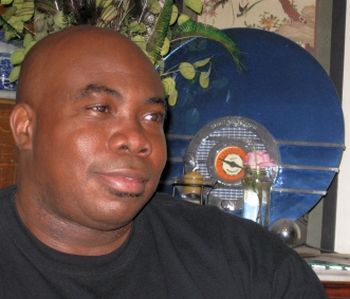 |
What Coleman really wants to prove, are his allegations state officials who he believes framed him.
He wants to see Kimble emerge from prison as a free man as he could not have committed the crime he was accused of, and because he would have long ago served the sentence of a white man in his shoes, even if he were guilty. But most of all, Kimble should be free because he aided an honest law enforcement official, Coleman, in trying to simply do the right thing. He placed himself at great risk.
Coleman wants to see the prison officials like Watson, so directly involved in the poorly contrived criminal case against him, investigated for their role in not preventing the stabbing of Clayton Howard. The assailant, William 'Dollar Bill' Thomas, had stabbed four black inmates in the past and was left in the main population, even after he made verbal threats against Howard's life. Coleman wants to see the people who put him through so much undergo the same process of scrutiny; that is being legally investigated and charged and if guilty, convicted and sent to the same place where they already work. They would be found not guilty, if in fact they are not.
For those who are, it would simply mean putting on a different uniform and saving that gas money that they burn up driving to work at the prison, and then home at the end of each day.
The nagging aspect that keeps people from sleeping: several of the players are the same Oregon officials who were involved in the murder of Michael Francke more than twenty years ago. We have that from very reliable sources.
Fighting From Within
Coleman says that from the day he started working as a Corrections Officer in 2005 at the main Oregon state prison, he observed what he describes as overt racism and a general attitude of acceptance of this behavior among the staff, regardless of their race. The racism he describes manifested in numerous ways, at different times, from different people, all with varying degrees of severity.
20 February 2006
We will go back to 20 February 2006 to give you a clear idea of the racism and crime taking place inside the OSP and other prisons in the state of Oregon. The problems in a general sense, are unregulated and the staff members are by all accounts, in many cases, serious criminals guilty of a number of major crimes.
That day at approx 9:30 p.m., former Oregon Corrections Officer William Coleman was accused of leaving a cell door open by a corporal whose last name is Garber. Coleman was also accused on this day of leaving a device known as a 'bar box' unsecured by a sergeant named Derden who alleged it happened at 6:30 p.m. the same evening.
Coleman says he can easily verify that both of these accusations were specifically untrue. While these reported incidents were not overly serious in nature, they set the stage for this story.
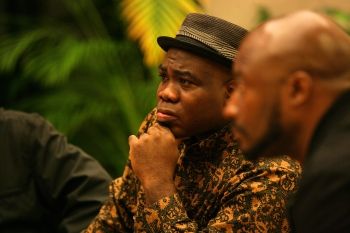 William Coleman at an NAACP meeting, Photo by Dexter Phoenix |
A captain named Jeff Forbes later said he, "counseled Coleman about breach of security in the area of assignment. Also, I gave him my expectations on how I expect his area of assignment to be in compliance with the post order. CO William Coleman said, 'He understood and it will never happen again.'"
Coleman says it never happened, he believes it was just part of an ongoing campaign to cite him for various issues that would be logged in his records.
"He never mentioned it once, how could I agree to never do something again when I didn't do it in the first place?"
In that same time period, February to March of 2006, a number of prison inmates had sent a 'kyte' to management stating that Coleman was being discriminated against by white officers. A kyte is simply a message from an inmate to staff. They are dropped into a box on the prison's control floor.
This is the time frame when Coleman was first approached by an African-American inmate named Clayton Howard, a highly educated 'jailhouse lawyer' - who asked Coleman if he was aware that there was an investigation against him.
Coleman says Howard explained at the time:
"Sgt Derden pulled me aside and said that, 'someone sent a communication form in and the kyte said white officers are discriminating against Coleman in E Block.' Derden wanted to know who had sent the communication form or 'kyte' as it was not signed.
Clayton told Coleman he didn't appreciate being used as part of their staff issues, explaining to Coleman, "I'm just an inmate".
That is when Coleman told Clayton, "You're coming with me to the security manager's office right now."
Coleman says he would have cuffed him in order to make him go, but that wasn't necessary. Clayton Howard followed Coleman to the supervisor's office. Security Manager Jennifer Bjerke was present along with two captains; Brandon Kelly and Tom Watson, according to Coleman, who admits he probably scared them when entering the office.
"I walked in there and I busted through the door," Coleman said.
Bjerke said, "Coleman what's up?"
Coleman said, "You're using inmates to help solve racial incidents with staff, pressuring Clayton to find out which African-American inmate had sent the form in."
"I had nothing to do with it", Bjerke replied.
Coleman, already embattled over calling attention to racial issues at the prison, recalls saying, "You're all in it together. It's a conspiracy to destroy me."
While observing the exchange, Clayton stood up and called Watson a liar, saying: "You know damned well you told me to find out who sent the kyte. You're the one lying Watson, you had Sgt. Derden ask me to find out who sent that in."
Derden was not present in the office, Coleman said. Watson and the other instructed Clayton Howard to leave the office and Watson stated to Coleman, "Wouldn't you want to know if someone had written that about you?"
Coleman replied, "Well there is a professional way to do it, this is not the way to do it, using inmates."
This led to a meeting between Coleman, Derden and Coleman's union representative, an officer whose last name is Parson, and also Tom Watson. Coleman said Watson and his union rep were trying to convince to him that Howard was a problematic inmate who brought lawsuits against the state.
Coleman explained that their points had nothing to do with what he was talking about. He says he was disturbed by these superiors' use of an inmate to gather information relating to a possible racial discrimination case.
Coleman said, "Parson surprised by by saying that he supported me on that one and believed Howard, even though he viewed Howard as a problem inmate." Parson suggested at the time that Coleman file a complaint with the Bureau of Labor (BOLI).
Coleman knew at this point that he was going to have some interesting days ahead. Rather than filing a BOLI complaint, he opted to try and work it out with his officials and keep the matter in house. It was in retrospect not the right thing to do.
Racist Protectionism
The next chapter in William Coleman's less than excellent adventure at the Oregon state prison involves a guard's antagonistic words written on an African-American inmate's entertainment magazine that arrived via federal mail, movie stars, spider web corruption, and Coleman's fast thinking actions that allowed him to get that magazine and all of its evidentiary value, out of the prison and into a safe place.
2 May 2007
"Echo Block and Delta are the two worst blocks" according to William Coleman, who on this day was assigned to work E block.
He explained, "Gangbangers and the worst of the worst are in these blocks. They are two man cells. The first two tiers, The second and third tiers are the worst in D and E block. These are double cells, the gang members and white supremacists are in there," Coleman explained.
4:00 p.m.
"I was working in E block assigned to the fourth and fifth tiers. I was passing out mail and doing the 4:00 p.m. count".
Coleman says he was walking down the tier handing out mail when inmate Terrence Kimble said, "Hey officer Coleman, look at this shit!"
Coleman recalls, "I advised Kimble to make a copy for his personal records. I told him to show it to as many inmates and staff as possible. I knew that he needed to get rid of it because if the article were to be exposed to others, the guilty officers will be in his cell looking for that magazine."
This is exactly what happened.
Coleman never said a word on day one; the prison officials learned of the magazine's existence because Kimble followed Coleman's suggestion and showed it to everyone possible. This in turn sent an alarm throughout the prison.
In fact an inmate in an adjacent cell, John Smith, said in a letter to Kimble that was intercepted by DOC staff and placed into their own investigation files; "This was bullshit. Kelly said they had you targeted. Yeah, the book is going through the drill."
The 'book' in this paragraph is of course the magazine with racial scrawlings.
As previously noted, Oregon law enforcement officials went to a great effort to build a case against William Coleman for tobacco smuggling which he defeated in court. While investigating Coleman's alleged smuggling activity, an inmate being interviewed referenced the magazine with the racial hate messages, and the police set up of Coleman.
Again, this screaming red flag for anyone in law enforcement who is honest goes on waving.
From an Oregon State Police report:Inmate Michael Kelly was interviewed between 8:59 a.m. and 9:30 a.m. on 12 June 2007. The material is directly from the Oregon State Police investigation.
"William Coleman was not the brother that was bringing tobacco into the prison. An inmate named "New York Boy" will tell em what's up and who was involved and white corrections officers are setting up Coleman. Kelly was asked to elaborate on corrections officers setting up Coleman and he would only talk about a magazine with racial writing that inmate "Midnight" (Kimble) had. Kelly would not elaborate further on Coleman being set up.
(See PDF of original Oregon State Police document.)
3 May 2007
On this day Coleman was assigned to E block, he recalls that his shift at this point was from 4:00 p.m. to midnight.
"As I entered the office, Officer Martin told me that I had a pick up order at cell 561. (Kimble's cell) I asked Martin what he (Kimble) was charged with and Martin replied, 'Racketeering'. I just shook my head and walked up to Kimble's cell to see what the officers had taken. I saw that they had taken his entire magazine collection except two or three that were left there."
Coleman talked to Kimble's neighbor, John Smith, who said the officers spent at least an hour going through Kimble's cell. An officer named MacBeth specifically conducted the cell search, according to Smith.
10:30 p.m.
Coleman's visit to see Kimble happened at approximately 10:30 p.m. that night in DSU, short for (Disciplinary Segregation Unit). This is where inmates involved in fights and rule violations end up.
On any given day in 2007, Coleman believes there were about 200 inmates in DSU. Additionally, he explains that IMU which stands for Intensive Management Unit, had roughly an equal number of prisoners. The IMU inmates include those who are on Death Row.
Why wasn't Johnson interviewed?

During this visit, Coleman learned that the Us Magazine had been handed to an inmate named Adisa Johnson for safekeeping. This is where the story gets very interesting. For me, it is easy to visualize a hand from above guiding the events that took place.
Later, when it all came to push and shove, and Coleman was facing up to 40 years in prison for crimes he didn't commit, an investigator named Robert Bothwell wrote beside Johnson's name in the investigation, 'No further information'.
See the original document that was entered into and part of the Oregon State Police Report on their investigation of Coleman: PDF
This is very noteworthy, as Adisa Johnson is the only witness listed on the investigation report whose first name is absent and whose SIG (inmate) number is missing- implying that he was not available when he was sitting in 'A' block the entire time, and was in no other place.
This single item seems to clearly isolate and illustrate the motives of Bothwell. All other inmates listed have first and last names, and SIG numbers. Bothwell needs to be investigated; his work is clearly biased and the papers clearly demonstrate this.
Here is Johnson's testimony from the Oregon State Police report: PDF
10:30 p.m.
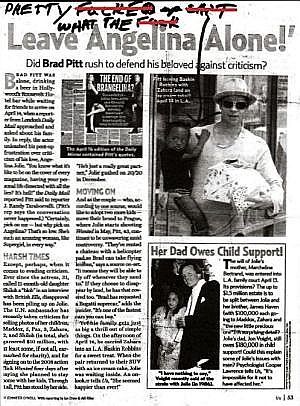
Everything in the Oregon state prison is locked down at 11:00 p.m. After learning where the magazine was, Coleman knew he had little time to get to 'A' block to retrieve it. To make matters worse, he could not just enter 'A' block at will. A corporal by the name of Inman had to unlock the door.
As soon as Coleman arrived at 'A' block, he looked in through a small thick glass window and lo and behold, there was Johnson, one of 200 inmates in this area, conveniently passing by.
Coleman rapped on the thick glass, and Johnson made eye contact with him and headed for his cell to grab the magazine with racial scrawlings. Corporal Inman had heard the Coleman's knock on the window, however he didn't know Coleman had already connected with Johnson.
At the exact time that Inman opened the door, Johnson handed the magazine to Coleman and Coleman's mission was complete. This all had to take place because prison officials didn't simply deal with things legally, above the board.
By 4 May at noon, corrections officers had raided 'A' block supposedly looking for contraband, when in fact they were looking for the magazine with racial scrawlings.
#1 Officer Hinzman, Curt
Sent to Capt. Watson Thurs 30 May 2007 11:22 p.m.Hinzman Curt to Watson, Thomas
Subject: CO Coleman
Captain Watson,
While working DSU alst night, CO Coleman came in about 10:35 p.m. He said he needed to talk to inmate Kimble in DSU 211B. He went up to the tier and CO Story let him on the low side to talk. He talked with Kimble for about ten minutes.
When CO Coleman came back downstairs, I asked him, 'What was up'. Coleman said 'I just finished packing up his house', and that was all he said. I asked Coleman where he was working tonight and he responded that he was in 'E' block. He said he needed to get back and left the building at about 10:50 p.m.
Seems odd that it appears he was down here on his own initiative. To my knowledge he was not sent down by anyone to interview Kimble. The evasive manner in which he answered my question, is what got me to thinking. Again it just seemed odd. Thought you should know.
Sgt. C. Hinzman (see: PDF of original document)
Story, ChuckThursday 3 May 2007 10:44 p.m.
To Watson, Thomas
Subject: Personal concern about inmate Kimble
Tom tonight Officer Coleman came to DSU about 10:10 p.m. He came directly to the second tier and asked to be let down the tier to talk to inmate Kimble in 211B. He had what appeared to be a post-it note in his hand. So I assumed he was on a mission from someone. When I asked 'what's up?' all he said was, 'Just checking on something.' When I went out for a smoke break I started thinking about it and it seemed a bit peculiar to me. When I asked the floor sergeant if Coleman had been sent to someone to DSU, I was told 'No, not by anyone out here'. Coleman was cell front for approximately ten minutes with inmate Kimble while I was on the landing, so I have no idea what the conversation was about. I'm sending this just as a FYI and so that I don't forget to let you know first thin in the a.m. It just didn't feel right to me.
Seth (see: PDF of original document by scrolling down to second entry)
It appears clear from communications posted by officials, that every clue existed to prove that Coleman was being set up for a fall by his superiors at the Oregon State Prison.
This seems especially true considering that the matter led to charges for tobacco smuggling against Coleman which he took to court and beat, (all counts) with a unanimous verdict. It appears the motivation was strictly to bust Coleman, not arrest and prosecute the actual offenders.
The fruitless search for the magazine that a guard had written racial messages in apparently frustrated the prison staff to no end. Coleman had completely outsmarted them. To this day he actually shakes his head and wonders why the facility didn't ever confront or charge the guard in question.
From an Oregon State Police report where Terrence Kimble is being interviewed by OSP detectives:"Kimble said Watson wanted to know where the book was. Kimble sad Watson told him he'd never walk the main line at OSP again." (see PDF of original document.)
Terrence Kimble wrote at length about the magazine incident from his own perspective. He believes he is being retaliated against by the Oregon State Penitentiary management for refusing to support Captains Tommy Watson and Brian Kelly's campaign of false statements against William Coleman.
3 May 2007
Kimble recalls that on 3 May, 2007, Officer Teal was covering Tiers 4 and 5 for Officer Martin. In the process Teal delivered his subscription magazine.
"While I was in my assigned cell, echo block 561, waiting to be released for my education call out, I was scanning through my magazine and discovered on page 83 the words written with a black felt tip marker; "PRETTY FUCKED UP SHIT. WHAT THE FUCK". Under the word 'shit' there is an arrow pointing directly to Brad Pitt and Angelina Jolie's adopted daughter who happens to be Black. I felt that Officer Teal's statement written in my magazine was very disrespectful and racist, so once I was released from my education call out, I immediately took the magazine to my job and gave it to another inmate."
Kimble says he then went to school where he attended his GED class.
"I was given a direct order by the education officer to report to the control floor. Once I arrived to the control floor from education, I was placed in handcuffs by officer MacBeth and escorted to Disciplinary Segregation. Once I was placed in the holding cage, Officer MacBeth stated to me, 'Just tell me where I can find the magazine and all this will go away' I remained silent, Officer MacBeth then stated to me, 'You can expect a DR'" (Disciplinary Report)
Kimble had been incarcerated in the Oregon State Penitentiary for seven years straight at that point, and during that seven years he says he hadn't received a disciplinary report in four years. This says a lot about an inmate. Soon his ability to stay out of trouble and harm's way, would completely vanish. Kimble has reported being physically abused on a number of occasions by prison staff at the Snake River Correctional Facility and Oregon officials bring no relief, in spite of the disclosure.
4 May 2007
Kimble continued, "On May 4th 2007, which was Friday, Captain Tom Watson came to the hole at approximately 8:30 in the morning. I was handcuffed and escorted to a room where Tom Watson was waiting for me. I quote Captain Tom Watson: 'You had a fucking visitor last night and I want to know what that motherfucker wanted and you better not lie to me.'"
Kimble says he stated to Watson that Officer Coleman wanted to see his magazine; the one that Officer Teal had written in.
Watson then stated, "Did you tell him where it was at?"
Kimble replied, "No, I didn't tell Officer Coleman who had it. Captain Watson said to me, 'Who has it?' I told Watson, 'Inmate Adisa Johnson has it in 'A' block.' Captain Watson then said to me, 'I need to get that magazine.'"
Kimble continued, "He also stated to me that if you mention anything to Coleman about Kelly and I building a case against him, your ass will never walk mainline at OSP ever again. I'll have Primo and Belleque transfer your ass so far out in cowboy country that you won't see shit.'"
7 May 2007
On May 7th 2007 at approximately 1:00 p.m., Kimble was transferred from Oregon State Penitentiary to the Snake river Oregon State Correctional Institution. That, in spite of the fact that the disciplinary report was dropped after going in front of a hearing officer.
"Before the transfer took place, when I was still in population, the month of April 2007, Sgt. Derden approached me stating 'that the IA is coming to visit you and I want you to tell them that Officer Coleman is bringing in tobacco.' Sgt. Gore Sr. and Sgt Derden were trying to get me to lie and make up false allegations about Officer Coleman. When the IA (Internal Affairs) came to speak to me concerning Officer Coleman, I refused to speak to them, so Miss. Duran, who is IA, and her colleagues, both gave me their direct phone numbers and told me that I have to cooperate with management."
At this point, as has happened several times throughout this story, information on major crimes by other prison staff was revealed, and the reports were ultimately ignored. Kimble tells a story that today, right at this moment, screams to be investigated.
"That's when I stated to them that, 'Management is paying inmates in canteen to lie on Officer Coleman.' I was given the opportunity by Capt. Watson to go to property and receive canteen and CD's from Corporal Lacy. I stated to Capt Watson, 'I have everything I need, my family provides for me. Miss Duran stated to me, 'You have our numbers, when you are ready to cooperate give us a call.' That call never took place because I refused to lie on Officer Coleman."
August 2007
In the month of August 2007 while Kimble was in the Oregon State Correctional Institute (OSCI), the Oregon State Police came to interview Kimble regarding Officer Coleman.
"Allegedly for bringing in heroin that an inmate in echo block 3-high overdosed and died. Apparently, this bogus information was given to the state police from Capt. Kelly and Capt. Watson, Sgt Derden and Sgt. Gore Sr. I stated to the state police that I told Capt. Watson as well as Capt. Kelly and now I am going to tell you; Melody Johnson brought the heroin into OSP that killed the inmate in April 2007. Melody and I did business together. I had given her $150 for a carton of Newport's and I knew all of her business, including who she was having a relationship with. The state police took notes and the interview was concluded. Once I was transferred to Snake River Correctional Institution (SRCI) the month of September 2007, I was placed in disciplinary segregation. On October 12th 2007 I was serving a sanction of 120 days. On this day Capt. Tom Watson had called from the Oregon State Penitentiary to Snake River Segregation Security Manager's office. Security Manager Bryan Cain had me escorted out of my segregation cell to his office."
He says Cain placed the phone to his ear and there was Capt Tom Watson's voice on the other end.
Capt. Watson reportedly said: "The state police are coming to Snake to interview you concerning Coleman. You better tell the officer that Coleman brought in the heroin, the tobacco and steroids."
Kimble says he replied, "Sure, whatever you say Capt. Watson."
"On and on Capt. Watson continued his threatening unprofessional behavior toward me, even after having me transferred to Snake River." (where Kimble remains today)
All of this over racial scrawlings in a magazine.
November 2007
One month later, in November 2007, detectives from Oregon State Police again visited Kimble and he recounted the pressure he was receiving from Capt. Watson to forge an allegation about Coleman.
"I stated to the two homicide detectives that Capt. Tom Watson called up here on October 12th threatening me because I refused to lie on Officer Coleman. I told several Oregon State Police who came to interview me about Officer Coleman: 'I am going to state to you what I have for months; Officer Coleman has been framed by management over at the Oregon State Penitentiary because he's not liked by the officers over there. Officer Coleman refused to join their team, so because Officer Coleman saw with his own eyes the corruption that took place and wouldn't be part of that team, he became a target of Capt. Watson and Capt. Kelly. Detectives stated that they received a call from Watson concerning the inmate who overdosed. I stated, 'Officer Coleman didn't bring any contraband, all I saw Officer Coleman do was his job.'"
"Melody Johnson brought in the heroin that killed the inmate, sirs, this interview is over." Capt. Watson came to R and D (Receiving and Departure) and before they transferred Kimble out, said, "I still haven't found that magazine" and walked off before Kimble could respond. He reckons Watson was headed back over to 'A' Block looking for it.
In his own report that stemmed from the magazine incident, Capt. Watson took the opportunity to heavily elaborate on Coleman's alleged smuggling of cigarettes into the prison; something that never happened a single time in Coleman's case according to court records:
"The information provided states Officer Coleman has been bringing in at least 20 cans of tobacco a week. Officer Coleman will not bring in any less than $2,000 worth of tobacco or other contraband due to the fact that he wants to make it worth his while."
I must say that this is a very gifted man; even a budding fortune teller. He let his speculative side run a little wild, to put it mildly. Perhaps it would be more correct to say he wrote pure fiction. To have the ability to know how someone wants to "make it worth his while" is some pretty inside stuff. Too bad so many tens of thousands of dollars in Oregon taxpayer money were spent trying to fruitlessly convict him. Too bad the wrong guy was taken to court.
And besides, the tobacco smuggling happens all day every day among the staff and their network of white supremest inmate allies, thanks of course to the rules that preclude cigarettes from the prison in the first place, something that never used to take place before the tobacco ban. Coleman knows who the players are, but they involve staff, so those reports of his were dismissed along with the rest.
Apparently locking state residents up for years in violent corrupt prisons wasn't enough punishment before. Coleman's case proves that if nothing else, tobacco crimes were a higher priority than Murder in 2007.
Corruption has a bad face; it's squished and pinched looking. It scowls and yells and screams 'liar' frequently, but at the end of the day it is just the greed of man finding a place to be.
Men have always taken advantage of situations, and going back to the Oregon State Penitentiary cattle smuggling days, ('way back' in the 1980's and yes, the black market prison industry was indeed supplying local restaurants with beef) and examining the prostitution rings, and the drug dealing, and the free weekend passes that inmates used to receive for 'helping out' the staff in their illicit pursuits; (one once led to a double Homicide) there seems to be little change to this face in many decades.
It is in charge though. The DOC has specifically denied permission for me to visit the mentioned inmates in this article, and they have done the same for William Coleman. This is a joke. They describe this writer and William, a former law enforcement official with a clean record, as security risks. Well, they aren't dumb by any means; they know my personal contact with these inmates would increase the information I have on the state corrections dept. As it is the DOC has gone to major effort to block mail and the US Postal service is also a complete farce as far as enforcing the federal mail laws. Everybody seems to be in it together.
In the same report, Watson takes the time to note that:
"I also received information on Officer Johnson, Melanie. the information I received on Officer Johnson is she is engaged in a sexual relationship with Inmate Harrell, James #5509176. Inmate Harrell goes down to the Clothing Room where Officer Johnson is assigned on Saturday mornings and they engage in sex every Saturday. Officer Johnson is bringing in tobacco, alcohol, DVD players and any other contraband items Inmate Harrell requests. This past weekend Inmate Harrell gave Officer Johnson birthday cards for her birthday that were made by another inmate."
That's right, the would-be Murder suspect, Melanie Johnson, is the same guard noted for her swinging sexcapades with a particular inmate at the prison.
It is a simple fact that many employees of the DOC have engaged in criminal activity, but suffered no legal repercussions as a result of being caught. This is typical in all situations involving corrupt law enforcement, whether they're in Mexico, Afghanistan, or right here in Oregon. One of the dangerous parts of this is something I have discussed in previous reports; police officers on the street, for the most part, have many obligations in executing their jobs. Their work ultimately has to meet the scrutiny of the District Attorney, (that usually means something even if it didn't in Coleman's case.) and it is again potentially reviewed by a judge.
In the corrections business everything is different, and that is why this nation that resembles a governmental prostitute all too often now has privately owned prison systems where convicts are farmed out for a few bucks. Stories of abuse emerging from those facilities are God awful also, but then making prison a business in the first place has the moral aptitude of a vacuum cleaner.
Good Loses the Battle
 A great source: FreeFrankGable.com |
Then you have the far opposite end of the spectrum, which is William Coleman trying to do everything legally and finding nothing but challenge in this pursuit, or Michael Francke, who diligently investigated the DOC as he was hired to do, and then was murdered just before revealing the goods.
This is the egg on the face of the Oregon justice system, and it doesn't help that the Oregon Attorney General's office won't even work with groups like Dateline NBC. It doesn't matter though, media moves without cooperation sometimes and the death of Michael Francke has even been featured on an episode of America's Most Wanted.
As far as I know, no other state has an adjudicated case that is considered less credible, and that does not make the administration of then or now look good in the eyes of the public.
 Without Evidence |
Michael Francke's death is even the subject of a movie starring Angelina Jolie, titled 'Without Evidence' and it tells the story of crooked investigators with Oregon State Police and the Marion County Sheriff's Office working very hard to convict Gable against all common sense.
It is noteworthy that Kimble reported Melanie Johnson's heroin smuggling and the subsequent related death that the investigators would try to hang on Coleman, and this official also noted her ongoing sexcapades with a prison inmate, yet this woman was never prosecuted for any of it. A good deal of this is a matter of record. /edit.php?storyid=19089 Of course Watson didn't have a beef with Johnson, he had it in for Coleman, as this portion of his report indicates:
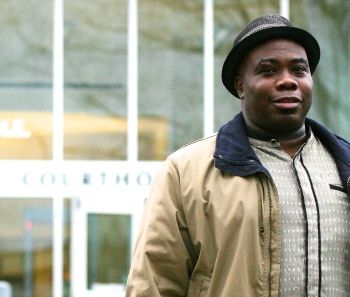 William Coleman during his civil trial. |
From the Oregon State Police report:
"The first staff member I have received information about is Officer Coleman. The information I have received is Officer Coleman has been bringing in tobacco. alcohol and other contraband, in for a number of months. The information provided states Officer Coleman has been bringing in at least 20 cans of tobacco a week. Officer Coleman will not bring in any less than $2,000 worth of tobacco or other contraband due to the fact that he wants to make it worth his while. However, he has allegedly been bringing in at least $4,000 worth of contraband per week. Officer Coleman brings the items in on Sundays and Mondays when he is assigned to the Dorms. Officer Coleman then gives the product to Inmate Joeckel, William #5011780. The items would then be taken to the metal shop and or hobby shop where Inmate Crosson was assigned. Once Inmate Joeckel became aware of Inmate Crosson's weekly dealings, he began to purchase tobacco from Officer Coleman as well. This is when Officer Coleman began bringing in larger amounts and making a larger amount of money. Officer Coleman would always get paid by Inmate Joeckel's girlfriend Brenda. She would meet Officer Coleman in the parking lot of a large supermarket, either Costco or Winco. When Inmate Yonkers when to DSU for protective custody, Officer Coleman was tipped off by an officer who works in DSU. It is alleged Officer Coleman received an email from the staff member and printed it out for inmates to read as proof of why he had to lay low for a while and quit packing tobacco. Inmate Yonkers wanted protective custody because he owed Inmate Joeckel $600."
Whew! What a lot of information about cigarette smuggling, even if it were true. But then go back and look at the previous paragraph where Watson describes a serious pattern of misconduct with a female guard, and happens to know how "This past weekend Inmate Harrell gave Officer Johnson birthday cards for her birthday that were made by another inmate." A little personal Captain?
Frustration would be the operating word for the DOC's position in trying to take down William Coleman. They had very little success bribing inmates to testify against him. However, if you listen to not one, or two, but a large number of inmates at OSP, bribery is a fixture of the prison culture in Oregon. We have numerous statements alleging this, and none of it is particularly hard to believe.
This instance might be particularly disturbing because Oregon officials, according to several written statements contained within the Oregon State Police report SUPPLEMENTAL # 07-175681, offered rewards to inmates in order to get them to testify for the state.
 |
Now, I know this next part is really hard to believe, and I don't claim to have definitive proof beyond the fact that this document linked below, but I can state for a fact that it was absolutely mailed to us by an inmate in the Oregon Corrections Dept. Could it be fake? Of course, anything could be fake; however this was sent because I heard of the form's existence and lo and behold, there it is, exactly as described.
It is a 'snitch form' and while we can assume(?) that the form is not an actual Oregon document, perhaps it is in the sense that somebody made it and has used it to gather information from inmates. All of the offerings are the same that have been described to us time and time again by former staff and inmates.
You can click on the image or visit this PDF to see the full document.
One person willing to snitch on Coleman, sort of, was an inmate named Crosson who gave what can only be considered a humorous answer to Bothwell's inquiry.
From the report: "I asked Crosson when was the last time he spoke to Coleman. Crosson didn't answer that question. I asked Crosson if there was any reason Coleman would implicate him. Crosson stated, 'He's a black cop and I'm a documented white supremacist'".
Wow, I have to admire the honesty of that guy. He died shortly after getting out of prison, shortly after agreeing to testify against Coleman. He was a lonely witness. Coleman actually had three witnesses on his behalf at his criminal trial. In addition to Howard and Kimble, a man who was a longtime Civil Rights activist and community leader in Portland, Oregon, John Smith, had plenty to say about the racist remarks in the magazine and Coleman's plight.
Statement from John Smith from the Oregon State Police report Smith said there was an incident where an officer made a racist remark on a magazine in which Brad Pitt was holding two kids and there an arrow pointing down at the mustache and the statement of 'What kind of shit is this?' 'What is up with this shit?' Smith said the book was passed onto Kimble and it was a 'People' magazine. Smith and Kimble approached an officer; their tier officer, and said he needed to go downstairs. This is bull-shit and he needs to go downstairs. Smith said he was told he would have to talk to an officer later.
Smith says he saw Kimble approach the day officer who was distributing meds to inmates, and that when Kimble informed him of the racial writing in the magazine, the officer laughed and said, "You don't think that's funny?"
This is the second significant report in the OSP paperwork where they allegedly learn that Coleman is smuggling, thus building an obvious paper trail.
Watson:May 8 2007
To: Ms. J Bjerke, Security Manager
From: T. Watson, Assignment Captain
Subject: W. Coleman investigation
Approximately seven months ago information was received that Officer Coleman was introducing contraband/tobacco into the facility. The information received was that Officer Coleman was bringing in tobacco and placing the tobacco into the garbage cans in E Block for Inmate Smith, C. This is not the first time this came up, the information was shared with Bob Bothwell but based on no other information coming in, it was decided to wait and see if more information could be gained. During the middle of February 2007 information was received by Sgt Derden and another source that Officer Coleman was packing in tobacco in large amounts for Inmate Smith. In addition to tobacco, I was informed that alcohol had also been brought in. Information was passed on to Mr. Bothwell and he conducted interviews.
"Information was received that an officer was bringing in large quantities of tobacco, ten cans a week and that he was dealing with Inmate Joeckel and that tobacco was then distributed from the dorm to 'D' Block and 'E' Block."
(I have to interject; it is extremely interesting how in each case, the prison officials seem to know exactly how many cans of tobacco Coleman allegedly brought in. They have very specific figures on reported earnings. This is an example of the bad information used to try to convict Coleman.)
Statement from Michael Kelly in Oregon State Police reportInmate Kelly stated "William Kelly was not the brother that was bringing tobacco into the prison. An inmate by the name of 'New York Boy' will tell me what's up and who was involved and white correctional officers are setting up Coleman. Kelly was asked to elaborate on the correctional officers setting up Coleman and he would only talk about the magazine with the racial writing that Inmate Kimble had.
Deeper and Deeper
Many are told as they are growing up, "You can't fix a lie with a lie".
Over and over in William Coleman's story, there are witnesses selected for questionable reasons, and other witnesses who are ignored or dismissed. Of course they are always those who have the actual story, which conflicts with the wishes of the DOC staff in their drive to bring Coleman down.
Personally, I think both the recent Salem lawyer who pitifully lost a slam dunk civil case for William Coleman, Kevin Lafkey, and the public defender in William's criminal case, Suzanne Taylor, may have intentionally harmed their respective cases and ensured William's defeat.
The difference is that in his criminal trial, William was given a chance to speak to the jury, and his testimony, along with that of a single inmate witness, led to a total victory with a unanimous not guilty verdict.
This doesn't happen every day in the world of so-called justice and instead of being lauded and given the credit it is due, we at Salem-News.com are the only media or anything else for that matter, with the exception of KBOO Radio in Portland which cares about the struggle of African-Americans, and KOIN Channel-6 (not sure if that ever aired) media has never paused to give this story the respect it is due. Again, Ruth Kovacs at KBOO featured Coleman's struggle in an interview with me one night, that was excellent.
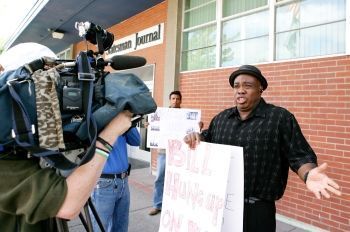 Coleman during the Statesman Journal protest |
It went so far that Coleman and a group of his supporters (including members of our staff) staged a fairly significant protest in front of the Salem, Oregon newspaper, Statesman Journal. The news paper never would give William positive coverage, and interestingly, I just noticed shortly ago, that the reporter from that newspaper, Alan Gustafson, was interviewed by the police as part of their investigation against Coleman.
I had somehow missed that. So now we perhaps have even more insight into how and why this important story was fully ignored by the newspaper, that is unless the story was somehow negative against Coleman, and they were, and once again it is something I have written about extensively in a feature report and also covered in a video news report.
I will say that I have received private contact from very high levels in regard to this story and case, and I know important people are paying attention and I appreciate that.
Earlier in the story I mentioned that William Coleman left his job as a prison guard and took a position with the Oregon State Hospital, famous for its role in the Jack Nicholson film, 'One Flew Over the Cuckoo's Nest'. All was fine until one day when a state police investigator involved in what would become the failed criminal case against Coleman, spotted him working as a hospital security guard.
The Oregon State Police detective, Greg Withers, admittedly went to Coleman's supervisor and immediately advised him of the investigation against William Coleman. (After all, he was a suspected cigarette smuggler of all things...) Shortly after that, a bizarre incident led to Coleman's firing and to this day, Coleman believes his supervisor fully judged him for having been "under investigation" with no focus on the outcome, which is everything.
 Oregon AG attorney Sarah Foreman |
Again, shortly after being fired from the state hospital, Coleman filed a case for wrongful dismissal and that same day, the very afternoon in fact, the DA in Marion County filed a pre-prepared 15-count indictment against Coleman for smuggling cigarettes during his time as a prison guard.
When I say the state had a bad case, I am putting it very mildly. Strangely but not surprisingly, the Marion County DA relied on white racists as witnesses in their case against him, as previously noted, and they lost big time.
Even if he had been guilty, it smelled of sham, whistleblower retribution and flagrant prosecutorial abuse from the offset, which equates to taxpayer abuse, but who do you tell, the Attorney General? Good luck, they are on the exact same team as the bad apple prosecutors and their office was highly complicit in the Murder of former DOC Director Michael Francke, back in the days of child porn convict/esteemed Oregon AG prosecutor Scott MacAllister, (a practicing lawyer in Arizona today in spite of the kiddy porn conviction) and they absolutely have no interest in being whistleblowers themselves.
Oh, I have heard from more than one individual on the condition of anonymity, that everything we allege is point on, but they won't dare go on the record, at least not at this time. Still they urge me to carry on this fight which I am doing without a doubt.
As I mentioned earlier, Coleman lost his civil case against the state and Lafkey, his former attorney, had no interest in helping Coleman after losing his big case for him. Lafkey told Coleman he would appeal after the initial loss, and then stated that he would need a large deposit to carry the case, and "he advised against it". It was sad to see William's big day finally arrive, only to end with nothing. The criminal and civil cases cost William thousands and thousands of dollars and the only good thing is that they weren't able to falsely convict him in a criminal court, we must always remember that.
Court Extortion
 Oregon AG attorney Ken Crowley |
The state AG lawyers painted Coleman to the all white (one Hispanic female) jury as, for all intents and purposes, a big mean black man, when in fact, he is the kindest, most honest person I have ever met. That is what got him into all of this, he's a Whistleblower who the state has afforded no respect to at all.
No friends of mine have ever weathered the storm the way William has; spending three years disconnected from his wife and kids as a result of the intense hardship associated with the various cases.
I strongly call foul against the state AG's attorneys, Ken Crowley and Sarah Foreman, for one thing that happened during the court proceedings in Salem. They said they had an "audio tape of Coleman confessing" to his earlier case, after he was found not guilty by a unanimous jury.
Now, the jury never heard about this tape, from what William Coleman and I recall, but those state attorneys were able to take up significant time from the judge who seemed to be in a concessionary mode during that trial, and whilst he didn't allow this confession tape to be played, he did let it take up the court's time. This is a clear violation of William's right that protects him from Double Jeopardy. The mere mentioning of the tape had an effect on the outcome of the case.
 Judge Hart |
Again, after he was found completely innocent, the state lawyers implied that Coleman, who fought for his innocence against a possible 40-year prison sentence, had actually confessed way back when on this audio tape.
That is the most ridiculous thing I personally have ever heard. It isn't how things work in this world. The state deflected its responsibility to Coleman in a dirty way and to this day they have never investigated any of the criminal allegations he brought forth. Shame on them. And guess who worked with the Oregon AG's office in coming up with this 'confession audio tape'? You guessed it, Bothwell.
Crowley said, "We're going to give this audio tape to Bryan Orrio. They also have a copy of the tape at DOJ."
I believe Crowley well knows the tape is fake, in fact he may know more about it than anyone.
Now, it gets even more interesting. First, audio tapes can be edited quickly as anyone knows; there is no science to it. Of course I have over twenty years in broadcasting experience and know more than some. The bottom line is that Coleman never confessed, and if they have a tape which says he did, they made it, and the person who made it is almost certainly Bothwell. Another part of this is something called Garritt's Rights that protect employees from having statements made to a supervisor taken to court.
Here is a very interesting related document where Bothwell and Stephanie Ingraham from Oregon State Police, another very active investigator in the Coleman case, discuss destroyed and redacted documents; again from the Oregon State Police report, visit this PDF
No Due Process Whatsoever
Over and over, Coleman was either ignored as a witness both by investigators and courts, and the most extremely questionable witnesses were called to convict him. This is a result of two things; racial prejudice Oregon's desire to not let a prison guard expose illegal Civil Rights violations against African-Americans in the Oregon State Prison.
Then they even lied about his proven innocence.
Conflict of interest doesn't even begin to describe it, good thing the state is complicit or this crap would never fly.
It makes me proud to be born and raised in California. Some day I would like to be able to proudly tell people I am from Oregon.
Mar-10-2011: Is There An Oregon Attorney Who Cares About Civil Rights? - Tim King Salem-News.com
May-04-2011: Civil Rights Case in Salem Demonstrates the Power of a 911 Call - Tim King Salem-News.com
Mar-10-2011: Reader Commentary: Can Oregon Government Change its Spots? - Salem-News.com
Mar-09-2011: Civil Rights Under the Gavel of Justice - Tim King Salem-News.com
Mar-08-2011: Oregon State Hospital and Staff Member Face Racism Charges Over Employee Termination - Tim King Salem-News.com
Mar-04-2011: How Far will Oregon Legal Officials go to Prevent Due Process? - Tim King Salem-News.com
Dec-27-2010: The 'Trickle Down' Effect of Whistleblower Retaliation - Tim King Salem-News.com
Dec-01-2010: Oregon Political Prisoner Being Stripped of Phone Use - Tim King Salem-News.com
Nov-25-2010: Tim King and Ruth Kovacs on KBOO's Prison Pipeline (AUDIO) - Salem-News.com
Nov-22-2010: Tim King on KBOO FM's Prison Pipeline Tonight - Salem-News.com
Nov-16-2010: Federal Mail Tampering at Oregon State Prison? - Tim King Salem-News.com
Oct-29-2010: A Witness With No Credibility - Tim King Salem-News.com
Oct-27-2010: Inmate's Life Threatened by Staff at SRCI - Tim King Salem-News.com
Oct-21-2010: Oregon Inmate Stabbing Victim Attacked Second Time - Tim King Salem-News.com
Sep-10-2010: Demonstrators Call Oregon State Hospital's Employment Practices Racist, Unacceptable - Tim King Salem-News.com
Aug-28-2010: Observations on Michael Francke's Murder, Frank Gable's Conviction, & a paid Confession - Salem-News.com
Aug-25-2010: Whistleblower Blues: Man in the Hole - Tim King Salem-News.com
Aug-11-2010: Demonstrators Protest Local Newspaper Over Racism - Tim King Salem-News.com
Aug-05-2010: Evidence Shows Oregon Inmate Was Falsely Convicted - Tim King Salem-News.com
Aug-03-2010: Chicken Night at the Oregon State Penitentiary - Tim King Salem-News.com
Jul-21-2010: Eyes on the Oregon State Prison: Voicing Concern for an Inmate's Life - Tim King Salem-News.com
Jul-14-2010: State Prison Whistleblower Says Oregon Corrections is Blocking Federal Mail - Tim King Salem-News.com
Jul-05-2010: A Denial of Civil Rights- Oregon's Collaboration in Racism Whistleblower Retaliation - Tim King Salem-News.com
Jun-26-2010: Getting Refamiliarized with the Murder of Michael Francke - Tim King Salem-News.com
Jun-23-2010: Local Media Downplayed Former Prison Guard's Struggle Against Racism - Tim King Salem-News.com
Jun-18-2010: Exposé: Skeletons Falling Out of the Closet of Oregon Corrections - Tim King Salem-News.com
Jun-17-2010: Scott McAlister: Child Porn-Related Conviction and Practicing Law - Tim King Salem-News.com
Articles for May 30, 2011 | Articles for May 31, 2011 | Articles for June 1, 2011

Salem-News.com:
Quick Links
DINING
Willamette UniversityGoudy Commons Cafe
Dine on the Queen
Willamette Queen Sternwheeler
MUST SEE SALEM
Oregon Capitol ToursCapitol History Gateway
Willamette River Ride
Willamette Queen Sternwheeler
Historic Home Tours:
Deepwood Museum
The Bush House
Gaiety Hollow Garden
AUCTIONS - APPRAISALS
Auction Masters & AppraisalsCONSTRUCTION SERVICES
Roofing and ContractingSheridan, Ore.
ONLINE SHOPPING
Special Occasion DressesAdvertise with Salem-News
Contact:AdSales@Salem-News.com



Terms of Service | Privacy Policy
All comments and messages are approved by people and self promotional links or unacceptable comments are denied.
Amie April 30, 2016 8:21 pm (Pacific time)
We will be protesting for the Exoneration of Frank Gable and for changes to be implemented within our unjustice system. Corruption and abuse of authority has been allowed for far to long. Beginning 10am in front of the Oregon Dept. Of Justice on May 15th 2016. Please join the fight. There is power in numbers and Frank Gable has sat in prison for 26 years to long. It is time to take a stand. Questions or if you would like to help please email freeingfrank@gmail.com.
hotcoffee website June 14, 2011 11:54 am (Pacific time)
http://hotcoffeethemovie.com/
Topic: Due process (civil or criminal) and the role of media.
"Seinfeld mocked it. Letterman ranked it in his top ten list. And more than fifteen years later, its infamy continues. Everyone knows the McDonald’s coffee case. It has been routinely cited as an example of how citizens have taken advantage of America’s legal system, but is that a fair rendition of the facts? Hot Coffee reveals what really happened to Stella Liebeck, the Albuquerque woman who spilled coffee on herself and sued McDonald’s, while exploring how and why the case garnered so much media attention, who funded the effort and to what end. After seeing this film, you will decide who really profited from spilling hot coffee."
June 14, 2011 11:50 am (Pacific time)
“Hot Coffee, The Movie”
Do we learn truth from mainstream media, or sometimes, more so, a distorted "version" of truth?
The trailer:
http://youtu.be/93fsFvVqviA
I believe HBO will broadcast June 27, 2011.
Silence Dogood June 9, 2011 8:02 pm (Pacific time)
A “DOOZY” OF A TRIAL:
This is a 'DOOZY' of true story which took place in a primarily “Democrat”, so called “Liberal”, controlled state of the Western U.S. Only the names of the actual players have been deleted in what follows below, so as to make a point. It could have happened anywhere, to any defendant. The deep-south, below the Mason-Dixon Line, is not the last bastion of racism as this case highlights.
This murder trial began in April 2007, continuing on into May…finally the time had come for closing arguments. “The only thing that can explain to you the reasons why witness after witness after witness is called to this stand and flat out denies what cannot be denied on that video is the code. And the code is BLACK FOLK don't testify against BLACK FOLK,” the county prosecutor told the jury at closing arguments. “You don't snitch to the police.
During questioning of at least one African-American witness, one court reporter noted that the prosecutor, who is white, pronounced the word “police” as “po-leese.”
“Would you agree or disagree with the notion that there is a code on the streets that you don’t talk to the po-leese?” the prosecutor asked.
The defendant’s attorney objected moments later. Asked by the whether he was objecting to the prosecutor’s tone of voice, the defense attorney said he was objecting to the question. The judge was unconvinced.
“I think you’re really objecting to the tone of voice that the [prosecutor[ is giving us,” the judge replied, “and I will ask him to try to ask your questions, let the jury decide whether this witness should be believed or not.” The prosecutor again said “po-leese” moments later.
Despite the trial judge’s earlier admonishment that it was not the State's
role to vouch for the credibility of the State's witnesses or its case, in closing,
the same prosecutor argued:
“Seventeen years and eleven months ago yesterday, I signed on, I signed on to serve at the pleasure of [the County Prosecutor]. I never imagined in a million years I would get to try as many murder cases as I have in the last 15 years, and I never imagined I would ever get to try one, a DOOZY, like this one.”
“Seventeen years and about ten months ago I started going to training sessions in the King County prosecutor's office on Saturday mornings that we just dreaded when we could be playing golf. . . . And two things stood out for me very shortly into my career as a prosecutor, two tenets that all good prosecutors, I think, believe. One is that when you have got a really, really, really strong case, it's hard to come up with something really, really, really compelling to say. And the other is that the word of a criminal defendant is inherently unreliable. “
“Both of those tenets have proven true time and time again over the years, and they have done it specifically in this case over the last five weeks -- four weeks. I never imagined when I signed on to serve at the pleasure of [the County Prosecutor], this won't be the last murder case I will try, but it is the last one I will try under his name. I imagined I would call eight [state’s] witnesses who simply will not or cannot bring themselves to admit what cannot be denied.”
The prosecutor returned to one point again and again throughout his closing argument. "And there is only one conceivable explanation for this, and it is called code…."all of those witnesses are protecting [a black defendant]. Why? It's the same thing I'm going to say over and over before I sit down. Code. It's all about the code."
The jury found the defendant guilty of one count of first degree murder and two lesser offenses. He may well be guilty. However, one might argue that defendants themselves are among ‘The People’ a prosecutor represents. The prosecutor and the judge owe a duty to a defendant to see that their rights to a constitutionally fair trial are not violated. One would expect a prosecutor should function within certain boundaries even while zealously seeking justice. A defendant's right to an impartial jury is surely violated when the prosecutor resorts to racist arguments and appeals to racial stereotypes, or worse, the racial bias of a jury so as to achieve a conviction.
Coverage of whistle-blower case June 3, 2011 4:22 am (Pacific time)
Link to Oregonian coverage of whistle-blower case... http://topics.oregonlive.com/tag/lindsay%20hunt/index.html BLUE, BLUE, BLUE: Be it public-employee prison guards, public employee security personnel, or even public-employee police recruits, coming forward as 'whistle-blowers': the BLUE-protection wall stands tall. Tall against all public-employee whistle-blowers in Oregon. Really, c'mon! Think about it, the government entities involved (local, County, or State) have dedicated pockets to defend their malfeasant agents and institutionalized-cultures against tattle-tellers. The tattle-tellers scrape the ground for attorneys to take their cases as "contingencies", only to be paid if whistleblower-plaintiffs prevail. All these whistle-blower cases have similar government defense strategies: DISCREDIT THE WHISTLE_BLOWER!!! Call them paranoid, dishonest, criminal, whatever it takes. Hire shrinks to diagnose them as paranoid, or suborn perjury from prisoners or arrested persons to target the whistle-blower for malicious prosecution. Whatever it takes, the number one rule for all BLUE- cultural entities is: Don't internally investigate the whistle-blower's complaint in anyway that any credible 'evidence' of the complaint is substantiated (in case it goes to TRIAL).
FSLy foxes again watch hen house. June 3, 2011 3:59 am (Pacific time)
Ho's precinct supervisors, NOT PPB Internal Affairs, investigated the "whistle-blower", Hunt's,complaints.. "As commander of Portland Police Bureau's Northeast Precinct, Bret Smith testified that he took ownership of the investigation into former recruit Lindsay Hunt's allegations of misconduct by her field training officer, Quency Ho, who worked under him (Smith)." "Smith said he made the decision to assign a precinct lieutenant and a sergeant to conduct interviews instead of sending it to internal affairs because he thought the precinct would be "more responsive." Smith later submitted his report to then-Assistant Chief Lynnae Berg. "(Smith)wrote in his report to Berg that Hunt, LIKE MANY probationary officers, appeared to view officer conduct in "BLACK and WHITE," and may have had an unfair "PERCEPTION" of Officer Ho. Then long comes a latter, CITY-contracted paid-gun shrink..Dr. Klecan, who described Hunt, at trial, "as inordinately suspicious, a PERFECTIONIST, and exceptionally RIGID person who is HYPERCRITICAL of other people, tends to MISINTERPRET events and MISREAD motives". Then we also have, Hubner (now retired from the P.P. Bureau) who gets on the stand and states: "I told her (Hunt) people aren't PERFECT. The Police Bureau isn't PERFECT…” http://www.oregonlive.com/portland/index.ssf/2011/05/former_portland_police_cmdr_br/4053/comments-2.html
June 1, 2011 8:35 am (Pacific time)
THe main problem about everything is that the people were too ignorant when voting for governor. They voted in a another globalist, and now the demise of the state. Or maybe they didnt, obama came and gave kitz the seal of globalist approval, so who knows how the election could have been rigged. Vote in a non-globalist governor, then support him/her feverishly, then things would change in Oregon for the better...Keep up the great journalism on this subject Tim. Main stream news are not journalists, the read teleprompters, written by the globalists..go figure
PPD's Ho needs to Go> June 1, 2011 12:53 pm (Pacific time)
Example of Portland Police Department Blue Wall of Arrogance vis a vis a Whitsle-blower:
[Return to Top]During testimony, the tag-word "perfect" is repeated by both the City of Portlan's "shrink" and the whistle-blower's former supervisor to describe her criticism's of the Department's recruit-trainer, one Officer Ho, whom she was assigned to "learn" from.
She felt Ho's on-the-job-training (by example) was not something she should emulate as an officer. It sounds like the department had no problem with Ho's sense of privilege, even Ho's demands (when lacking probable cause) of citizens.
http://www.oregonlive.com/portland/index.ssf/2011/05/dueling_psychological_analyses.html
©2026 Salem-News.com. All opinions expressed in this article are those of the author and do not necessarily reflect those of Salem-News.com.